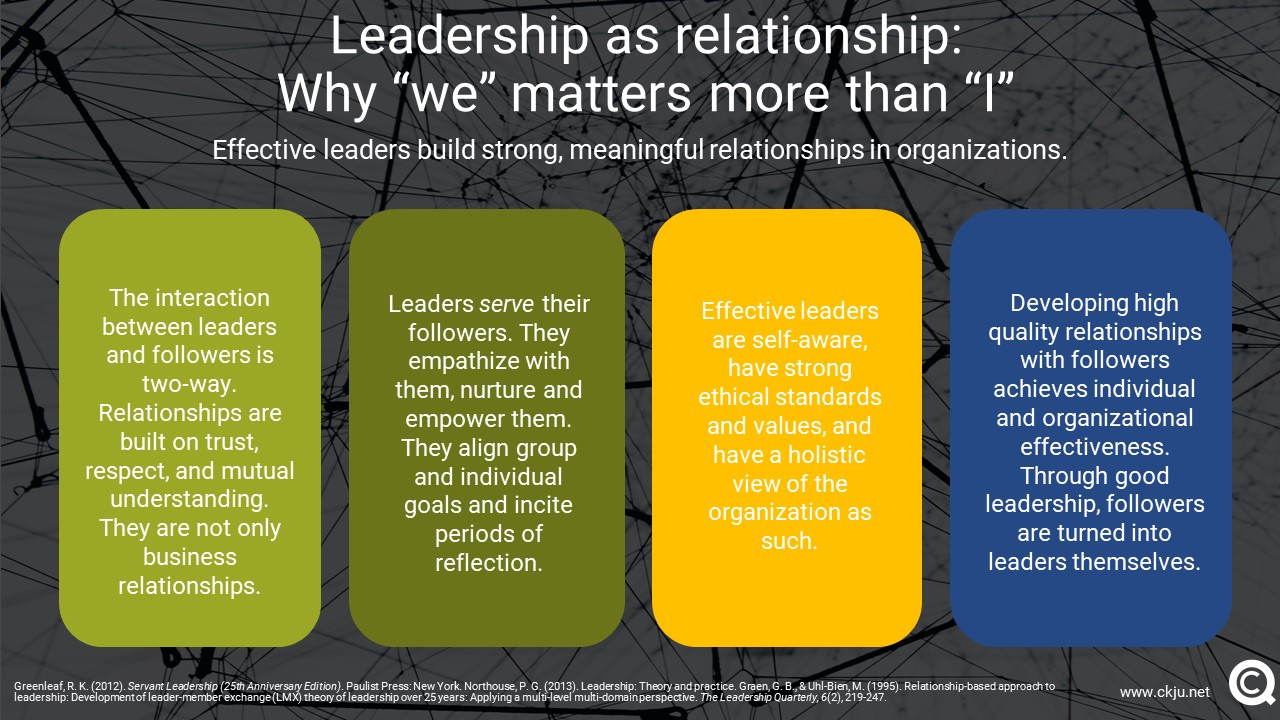- All Management Learning Resources
- Leadership as a relationship

Executive summary
This CQ Dossier focuses on the importance of relationships within the leadership literature. It addresses the theories of leader-member exchange (LMX) and servant leadership to describe how effective leaders build quality and strong relationships with each of their followers to gain commitment to the organizational mission. The dossier describes how particularly servant leadership theory goes beyond transactional approaches that emphasize compliance to embracing approaches that focus on the growth of the individual to build a strong community.
Contents
- Executive summary
- Relational leaderhip focuses on the importance of building trust and confidence
- Leader-Member Exchange Theory (LMX) describes the relationship that develops between leaders and followers
- Servant leadership is based on the assumption that leaders are not in a position of power above followers
- Servant leaders listen, reflect, and consider the merits of everyone in the group
- Servant leaders are self-aware and have strong ethical standards and values
- Servant leaders view the organization as an institution that exists for the greater good of society
- Relational leadership theories emphasize the importance of building quality relationships
- Key take-aways
- References & further reading
Relational leaderhip focuses on the importance of building trust and confidence
The management gurus James Kouzes and Barry Posner discuss the importance of relational leadership in their book, The Leadership Challenge. They state, “When leadership is a relationship founded on trust and confidence, people take risks, make changes, keep organizations and movements alive. Through that relationship, leaders turn their constituents into leaders themselves” (Kouzes & Posner, 2007).
This CQ Dossier focuses on two theories of leadership that regard the process as a relationship–leader member exchange (LMX) and servant leadership. Both theories focus on the importance of building strong relationships for leaders and subordinates to work effectively together.
Leader-Member Exchange Theory (LMX) describes the relationship that develops between leaders and followers
The first leadership theory is leader-member exchange (LMX) and focuses on the relationship between leaders and followers. This theory focuses on the relationship between the leader and each subordinate or dyad, so the theory posits that leaders develop an exchange with each of their subordinates and is a two-way interaction. The theory suggests that each of these relationships are unique and that the quality of the leader-member exchange relationships influence subordinates’ responsibility, decisions, and access to resources and performance (Bauer & Ergoden, 2015). The relationships are based on trust and respect and extend beyond transactional, business relationships. Subordinates who develop strong emotional attachments with their mentors tend to engage more fully within the organization and become effective team members (Day & Miscenko, 2016).
Servant leadership is based on the assumption that leaders are not in a position of power above followers
The servant leadership theory is based on the premise that leaders are effective when they first serve their followers. Essentially, the leader is not in a position of power above the followers, but the emphasis is on the leader meeting the concerns of the followers (Northouse, 2013). An effective servant leader empathizes with their followers and nurtures and empowers them to help them reach their full potential (Greenleaf, 2012).
There are ten characteristics that are central to the concept of servant leadership. They include
- listening,
- empathy,
- healing,
- awareness,
- persuasion,
- conceptualization,
- foresight,
- stewardship,
- commitment to the growth of people,
- and building community.
Servant leaders listen, reflect, and consider the merits of everyone in the group
Communication is an important skill for all leaders yet servant leadership emphasizes the value of listening intently to others. The servant-leaders seeks to identify the aims and goals of the group and helps them fulfill this mission. The servant-leader is receptive to what is being said within the group. One of the hallmarks of a servant-leader is the ability to balance listening with periods of reflection to consider what they can offer the group (Greenleaf, 2012).
The servant leader also strives to empathize with others and accepts their individual characteristics. So, although the servant-leader might not like something that they did, they choose not to reject them as people. Effective servant-leaders are also able to heal through forgiveness of themselves and of others.
Servant leaders recognize that they have the ability to help those who have been emotionally hurt and so they strive to help them when they come into contact. Greenleaf describes this healing process in the following way, “There is something subtle communicated to one who is being served and led if implicit in the compact between servant-leader and led is the understanding that the search for wholeness is something they share.”
Servant leaders are self-aware and have strong ethical standards and values
Another characteristic of servant-leaders is that they are self-aware and so have strong ethical standards and values. Having this strong sense of morality enables servant-leaders to have a holistic view of the organization. Servant-leaders have an inner peace yet are also able to tackle and challenge thorny issues within the organization that are based on their code of ethics (Greenleaf, 2012).
Servant-leaders also eschew power relying instead on rational persuasion to convince others to make decisions that are right for the firm. In particular, they dislike coercion and compliance from subordinates and use consensus to build agreement within groups. Servant leaders also use conceptualization to form a big picture for the community and organization. They think beyond the daily realities of organizational life and yet are still able to maintain a balance between a focused approach and conceptual, long-term thinking.
Servant-leaders also show foresight so they are able to determine the consequences of decisions for the future. Foresight is a characteristic that enables the servant-leader to understand the lessons from the past, the realities of the present, and the likely consequence of a decision for the future. It is also deeply rooted within the intuitive mind. Foresight remains a largely unexplored area in leadership studies, but one most deserving of careful attention. One promising area that sheds some light on this topic is agility and agile leadership.
Servant leaders view the organization as an institution that exists for the greater good of society
There are three characteristics of servant-leaders that show a commitment to the community and people in organizations. These are
- stewardship,
- commitment and
- building community.
Stewardship means serving the needs of others to serve the greater good
Stewardship occurs when the servant-leader views the organization as an institution that exists for the greater good of society. This stewardship emphasizes the main goal of servant-leadership which is first and foremost a commitment to serving the needs of others coupled with an ability to persuade and to be open rather than to control others.
Servant-leaders are committed to nurturing individuals and their potential
This stewardship is also revealed in the commitment that servant-leaders have for the growth of people. Servant-leaders believe that people have an intrinsic value beyond their contributions as employees so they engage in nurturing each individual within the organization.
Role modeling helps build communities that hold together
Finally, servant-leaders are adept in building community particularly after change has occurred and people feel they have lost some of the familiarity of old-style organizations. Greenleaf believes that in order to build and rebuild communities, servant-leaders just need to show the way through demonstrating their own unlimited liability. In fact, Greenleaf believes that mass movement is not needed but just for the servant-leader to be an excellent role model for others (Greenleaf, 2012).
Relational leadership theories emphasize the importance of building quality relationships
In conclusion, this CQ Dossier focuses on two relational-based leadership theories: leader-member exchange theory and servant leadership. Both theories emphasize the importance of leaders building quality relationships with their followers in order to achieve individual and organizational effectiveness.
Both theories demonstrate the importance of effective communication that allows both leaders and followers to build trust and commitment. The theories also show how power and coercion are unnecessary sanctions that only exist to harm the organization. The most effective leaders are those who are open and transparent with their followers and serve the community in a way that benefits everyone.
Key take-aways
- Subordinates who develop strong emotional attachments with their mentors tend to engage more fully within the organization
- Leaders are effective when they first serve their followers
- An effective servant leader empathizes with their followers, listens, and is self-aware
- Servant-leaders nurture each individual within the organization
Management skills newsletter
Join our monthly newsletter to receive management tips, tricks and insights directly into your inbox!
References & further reading
Bauer, T & Erdogan, B (2015). The Oxford Handbook of Leader-Member Exchange. New York, NY 10016: Oxford University Press.
Day, D & Miscenko, D (2016). In Bauer, Talya & Erdogan, Berrin, eds. Leader-Member Exchange (LMX): Construct Evolution, Contributions, and Future Prospects for Advancing Leadership Theory. New York, NY 10016: Oxford University Press.
Greenleaf, R. K. (2012). Servant Leadership (25th Anniversary Edition). Paulist Press: New York.
Kouzes, J. M., & Posner, B. Z. (2007). The leadership challenge. San Francisco, CA: Jossey-Bass.
Northouse, P. G. (2013). Leadership: Theory and practice.
About the Author

Related Dossiers






